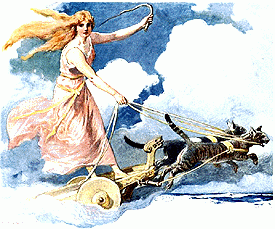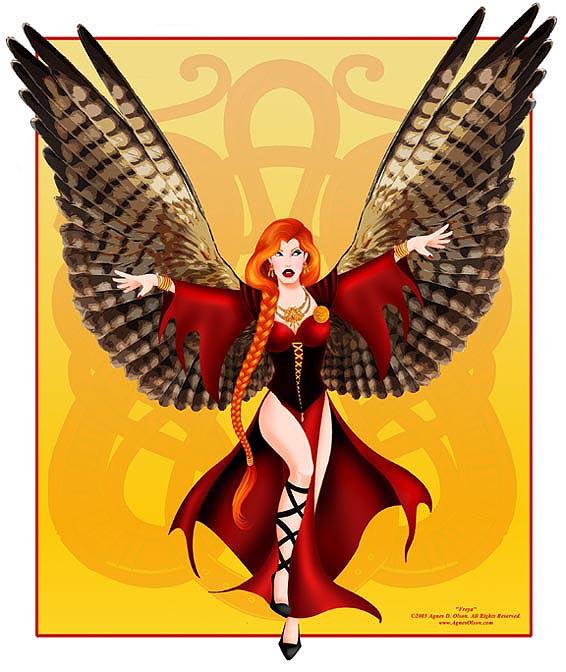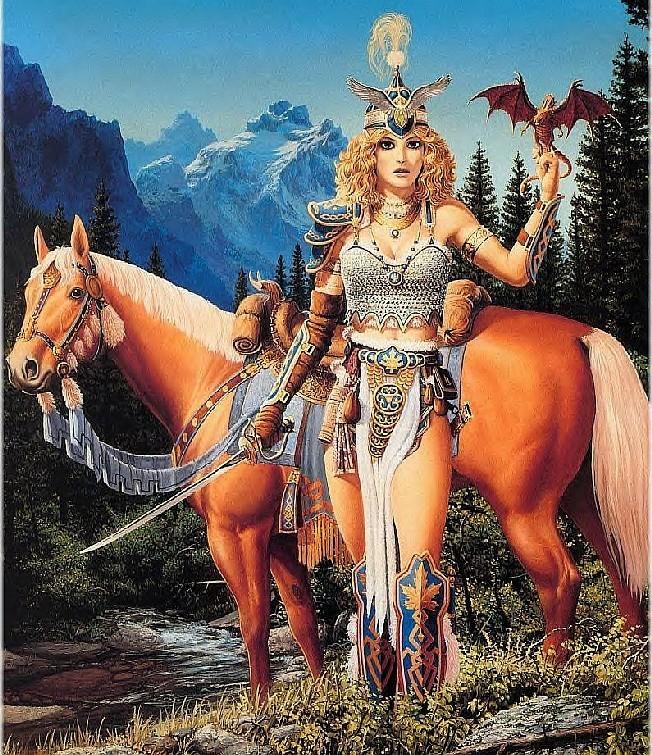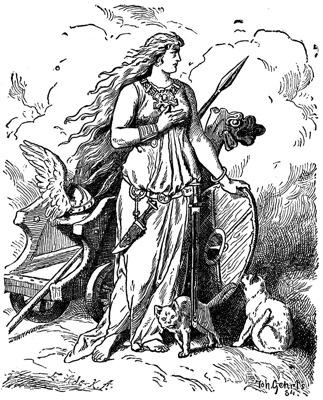Freya, the "Lady," is among the most powerful and enchanting of all active goddesses in the world today. A testament to her importance in the Norse spiritual schema is the fact that of all the goddesses to appear in the myths, she alone among them had a large amount of her individual stories preserved by the chauvinistic male Christian scholars of Norse descent who re-recorded the myths following the fall of Pagan dominance in the North for the purpose of preserving an important aspect of their cultural heritage for prosperity.
Freya can be considered a female jack of many trades amongst the deities, as she is a goddess of love, beauty, sexuality, fertility, magick, witchcraft, enchantments, hidden knowledge, warfare and self-defense, and a mistress of cats. Her physical beauty and sensuality rivals that of the Greek goddess Aphrodite, and her natural affinity with the feline species is comparable to that of the Egyptian goddess Isis. She has a strong warrior aspect to her and can be called upon in that capacity for fierce protection--an aspect of hers in which she is sometimes referred to as 'Freya of the Black Swordhand'--and as the name of this aspect of hers would suggest, she wields a sword with fearsome alacrity in combat. However, more often she is invoked for her purview over romance and carnal pleasures, and as such she can be seen as a patron goddess of all girls and women who are proud of their natural sexuality, and who are not afraid to make this point known despite the double standards inherent in modern society thanks to the continuing influence of the Victorian mentality. Her ability to cast enchantments and to work wonders over the natural forces of the cosmos via her great magickal skills are useful to all practitioners of the mystic arts who may call upon her to enhance the effectiveness of their own prayers and workings; as such, Norse Wiccans consider the famed ancient occult symbol--the five-pointed star known as the pentagram--to be her official symbol. She is an unequaled mistress of the ancient Norse magickal art referred to as sheide (pronounced 'she'), and many female practitioners of sorcery in the ancient Norse culture were her mortal acolytes in the practice of this powerful form of magick. Freya was the only member of the Norse pantheon other than Odin himself to have knowledge of the ancient symbols of power and divination known as the runes, but unlike Odin she didn't have to engage in the torturous trials that he did in order to gain this runic mastery.
A member of the Vanir tribe of fertility deities who merged with the Aesir tribe to form the Asgardians, Freya is the twin sister of the fertility and nature god Frey, daughter of the powerful sea god Njord, and (as alleged in some sources) the earth goddess Nerthus. She was once married to the mysterious god Od, who vanished for reasons unknown, and whom she has continuously but unsuccessfully attempted to find, a situation that causes her to frequently cries tears of gold over the loss. She is a shape-shifter of great renown, and is most well known for possessing an enchanted cloak of falcon feathers that, when donned by her, enable her morph into the form of a falcon, taking on all of this bird of prey's physical attributes for her own use, including long-distance flight and stealth or reconnaissance. Most famously, she possesses an enchanted necklace called Brisingammen whose exact properties were never described in the surviving myths but is obviously of great value to any practitioner of magick. The degree of Brisingammen's value is demonstrated by the fact that Freya unhesitatingly slept with the three brothers of the Asgardian race of dwarves who forged this great piece of jewelry as payment for it. She owns a personal chariot that she uses for transportation, and appropriately enough she utilizes two large male cats named Brygunn and Trygunn to pull this vehicle for her.
As another great example of Freya's status and influence in the Norse pantheon, her jurisdiction and power extends to that of the afterlife and the souls of mortals who revered her while living, and she can be considered a benevolent goddess of the dead for this reason. She ruled over half the fallen warriors of great courage and other virtuous and valorous individuals whose spirits passed into Valhalla, the Norse equivalent of Heaven, with Odin ruling over the other half; Freya, however, was said in the legends to get the first choice of these noble shades, and she ruled them in a section of Valhalla known as Folkvangr (the common and dishonored souls of the mortal and divine dead went to two other afterlife realms, Helheim and Nifleheim respectively, and were under the province of the dark goddess of the dead, Hela). Since the warriors and virtuous who were judged worthy of entrance into Valhalla were determined and escorted there by the 13 warrior goddesses known as the Valkyries (the "Choosers of the Slain"), Freya acted as their leader, and they were responsible to her just as they were to Odin. This role is befitting of both her warrior attributes and her power as the co-ruler of the heroic and noble dead.
Due to Freya's name, which is actually the title of "the Lady," she is often viewed as the Goddess aspect to Norse Wiccans (though others prefer Frigga, the queen of the Norse deities, in this capacity), and she is often considered the Mother aspect of the Wiccan Triple Goddess (though, again, this aspect is sometimes preferentially afforded to Frigga).
I have been told by more than one individual that they felt they were specifically 'chosen' by Freya to revere and bond with both her and her fellow Asgardian deities for reasons not entirely known to them. Her power over the material world is clearly in evidence, and her influence over those who follow the Norse path, both in ancient times and in the present era, is tremendous, depending upon her level of interest in any particular individual at any given point in time. I have striven to gain a good rapport with her, and though she wasn't the specific deity of the Norse pantheon whom I felt 'chose' me to spiritually bond with the Asgardian deities, I nevertheless acknowledge her power and scope of influence over the aspect of the cosmos that I often utilize to help guide me along my unique path in life, and I hope that in time I can gain her respect and favor.





